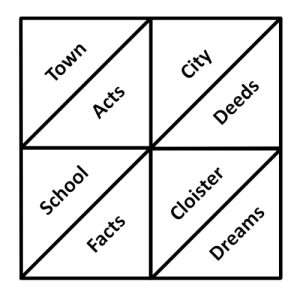 Professor of Literature Joseph Campbell [1] popularized the monomyth of the “hero’s journey” [2], a recurring template for the plot arc or cycle of many heroic characters found in mythologies and even popular modern stories. From his most famous book, “The Hero with a Thousand Faces”:
Professor of Literature Joseph Campbell [1] popularized the monomyth of the “hero’s journey” [2], a recurring template for the plot arc or cycle of many heroic characters found in mythologies and even popular modern stories. From his most famous book, “The Hero with a Thousand Faces”:
A hero ventures forth from the world of common day into a region of supernatural wonder: fabulous forces are there encountered and a decisive victory is won: the hero comes back from this mysterious adventure with the power to bestow boons on his fellow man. [3]
Quite a few diagrams are available showing the generic journey of the hero or heroine; some are more complete than others, and the one I present here is no exception. Campbell’s schema is said to have seventeen basic parts to it, but not all elements need to be present in any specific narrative. I list four basic “acts” (separation, descent, ascent, unification) and twelve basic events, including four thresholds: 1st) crossing into the special world, 2nd) surmounting the supreme ordeal, 3rd) returning to the normal world, and 4th) journey’s end and / or beginning.
- Call and Refusal
- ——–< Separation >
- Meet the Mentor
- Crossing Over (1st Threshold)
- Tests, Allies, Enemies
- ——–< Into the Abyss / Descent >
- Inmost Cave / Whale Belly
- Supreme Ordeal (2nd Threshold)
- Ultimate Boon / Reward
- ——–< Magic Flight / Ascent >
- Road Back / Refusal
- Crossing Back (3rd Threshold)
- Return with Elixir / Resurrection
- ——–< Unification >
- Master of Two Worlds
- Freedom to Live (or Die) (4th Threshold)
Any hero’s journey must be transformational, and so has associations with alchemical change. It must be of such difficulty that it utterly changes the nature and the mindset of the traveler. Even though many supporting characters may influence, help, and even hinder our hero, it is ultimately about their journey, their sacrifice, and their reward. But what the hero brings back with them is also key to the story, because it is for the benefit of others as well as for themselves.
An interesting dissertation by Richard Warm that I ran across recently proposes that leaders, like heroes, need ordeals and trials in order to bring back the inspiration and wisdom to motivate others. From the abstract:
This dissertation will explore leadership as a mytho-poetic transformational journey toward self-knowledge, authenticity, and ultimately wisdom; the power to make meaning and give something back to the world in which we live; and the necessity of transformation. I view leadership as a transformative process and a transformational responsibility. As leaders we must undergo our own transformation in order to lead change on a larger scale. The dissertation will be both philosophical and theoretical, exploring how the threads of the hero’s journey, transformation, wisdom, and leadership intertwine. …[4]
These ordeals may also be of an intellectual or moral kind, and not just feats of strength or stamina, although those are important too. Warm also has a company [5] for coaching you on your leadership, life, and legacy.
One of my favorite books that I think of when the hero’s journey comes to mind is “Figures of Earth: a comedy of appearances” by James Branch Cabell. It is a bit of a spoof on fantasy tropes, well before its time. However, I’m not quite sure what the “magic elixir” is that the hero returns with except for his story: that life is what you make of it, or what it appears to be to others, or what you can convince yourself that it is, or that it is what it is and must be sufficient to you in the end.
References:
[1] https://en.wikipedia.org/wiki/Joseph_Campbell
[2] https://en.wikipedia.org/wiki/Hero%27s_journey
[3] Joseph Campbell / The Hero with a Thousand Faces
[4] https://aura.antioch.edu/etds/113/
[5] https://mythoscoaching.com/
Further Reading:
https://tvtropes.org/pmwiki/pmwiki.php/Main/TheHerosJourney
http://www.movieoutline.com/articles/the-hero-journey-mythic-structure-of-joseph-campbell-monomyth.html
https://en.wikipedia.org/wiki/Figures_of_Earth
“There are one or two things that I do not fancy the looks of in this torture-chamber.”
[*6.38, *6.133, *6.149, *9.200, *11.70]
<>
 All art constantly aspires towards the condition of music.
All art constantly aspires towards the condition of music.






